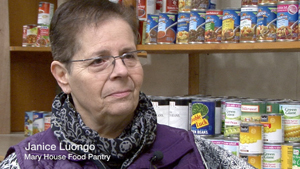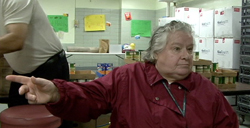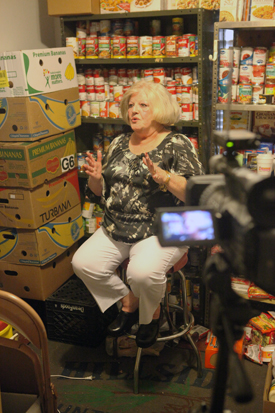AARP Hearing Center
En español
By Jody McPhillips and John Martin
Hungry in the West End addresses senior hunger in Providence's West End community -- an area of hard-core poverty burdened further by the recession. This series attempts to put a face on the problem of senior hunger in the West End and throughout America, and to give voice to those who are responding to the challenge of feeding the hungry. This is Part 4 of the series. Start here to begin with Part 1.
In the heart of the West End, in a quiet corner in the basement of Ebenezer Baptist Church there is food every Wednesday. It is one of the ways hungry seniors in the West End are getting by.
"The number of families has tripled, I think, in the last several years, and the church has sought to meet that need," says Pastor Carl Balark. Patrons "may or may not be a part of the congregation. They just come in the neighborhood, they know food is available and they get the food."
Balark is proud of his congregation but he especially praises deacons George Garedo and Ben McClary. On our visit to the Ebenezer pantry, they explained that, on average, about 65 West End families are served each week. Garedo and McClary say many seniors are driven by friends or family members and wait in cars to receive food. This, they say, makes them wonder about the unmet hunger needs of the elderly homebound.
Seventy-three-year-old Reina Prarra knows exactly how much money she has to live on each month, and she knows what her expenses are. There's rent, car insurance, electricity, gas, and all the little odds and ends that crop up.
Retired from her job as a jewelry finisher, she gets $869 per month.
It isn't enough.
So she stretches her dollars by a weekly visit to the food pantry run by the Open Table of Christ, 1520 Broad St. A native of the Dominican Republic, she arrived in Rhode Island 26 years ago, and became a US citizen after living here for 20 years.
"This is the only food pantry I come to," she says, and the food she gets at the pantry literally keeps her from going hungry. "I will do whatever I can" to make it last the week, she says. "I will cook less, cook simple dishes."
The OTC food pantry operates two days a week and serves hundreds, from the areas of Washington Park, South Providence and the West End. The state's 200-plus pantries divide up their territories by zip code, so they don't duplicate efforts; OTC is responsible for 02905 and 02907.

Janice Luongo supervises Mary House, the pantry at St. Patrick's parish, located on Smith Street, practically in the shadow of the State House. She says that her small pantry and once-a-week congregate meals attract people from all parts of Rhode Island, including the West End. Add her to those who worry about the isolated seniors who do not find their way to pantries. She has tried her hand at delivering food, but the delivery address on some low-income streets could be next door to a crack house. Or worse. Not unlike the West End, that's tricky, if not risky. She and a volunteer recently delivered food to an older woman they identified who lives alone and is in a wheelchair. "But what I asked her to do was to please have someone downstairs at the door."
You're never sure, Luongo says, adding that she is not a stranger to tough neighborhoods, having once been a drug addict living on the streets of nearby Federal Hill.
"But (the delivery) went seamlessly and I began to think, maybe we should start deliveries to the homebound." Easily said, but finding volunteers to do this work in an inner-city environment would be an enormous challenge. "If you look at soup kitchens and food pantries, a lot of the (volunteers) are older. So, you're not going to get a 60 or 70 year-old to get in a car with me and to go drive to someone's house in South Side, Mount Pleasant, West End, wherever."
It is similar to challenge Meals on Wheels faces, particularly in the West End. For Meals on Wheels, volunteer safety fears mean hiring paid drivers to work the neediest neighborhoods. And those costs subtract from what can be spent on food. Watch John Martin's interview with Janice Luongo.
Those who patronize the pantries say the food is important, but just knowing there is a place to go for help may be just as important.
"The main thing I think about is food," said one patron who did not want to be identified. "There's always the fear that I will run out of food, of where my next meal is coming from."
Offerings vary from week to week at the food pantries, but most patrons say the quality is high. OTC, which has freezers and refrigerators, is able to offer chicken and other meat--when they have it.
Across town at St. Teresa de Avila, food pantry volunteers are in temporary quarters while waiting for their new building to be ready in early 2013. That limits their offerings to bread and baked goods, fresh produce, and whatever prepared food has come in that morning. On an average day, that can includes pizzas, sandwiches and elaborate chicken salads from Trader Joe's.

It was here that we met Yvonne Patalano, a regular visitor who wheels her way into the pantry aboard her motorized wheelchair. A retired nurse, she lives at home with her two never-married adult children. Money is tight; food from St. Teresa's helps her get by. Some months are better than others, but some she describes as "horrendous," with her food budget at "almost zero" by the end of the month. Asked how she gets by, she merely shrugged an pointed to the pantry shelves. The choices do not matter she says. "It doesn't matter. As long as I'm able to get it. Watch our interview with Yvonne Patalano.
St. Teresa's is unusual in that it is open five days a week. Bread, produce and prepared foods are offered on Mondays and Fridays, with canned and boxed foods available Tuesday through Thursday.

"We serve about 7,200 people a month," says Lorraine Burns, who has run the center for the past 15 years. "About 420 of them are over 65." Since the economic slowdown, she says, "the biggest difference I am seeing is professional people, like teachers, a couple a week." She also see many grandparents living in familes and helping to care for young children. A common problem, she says, is that seniors will often quietly make food sacrifices if children in the household are hungry. Watch our interview with Lorraine Burns.
At the West End Community Center, social service director Olivia Martinez runs a small food pantry from her office. With no refrigeration, she offers canned beans, rice, cereal and other items that don't spoil.
"Mostly, people come once a month," she says. "We work with areas in the West End. If somebody comes from outside the area, we'll serve them, but we do an intake and send them to the right place for next time."
Martinez says -- and most everyone running a food pantry agreed on this point -- very few people try to scam the system. "People come here because they need food." On her busy days, she gets about 60 people, and estimates 35 percent of that number are elderly. Many are Hispanic, so she stocks lots of rice. "I'm trying to switch them from white rice to brown," she says. "We try to encourage them to eat healthy."
You you need food or if you are interested in volunteering, you can find a listing of Rhode Island food pantries, their contact information and hours here.
Hungry in the West End
AARPRI
Explore Jody McPhillips' Web series
Part 1: The Problem is Simple, But Not the Solution
Part 2: Feeding People Too Ashamed to Ask for Help
Part 3: Meals on Wheels Feeds the Homebound
Part 4: Food Pantries Feed All Comers
Part 5: Food & Friendship Served Up at St. Martin de Porres
Part 6: Nutritionists Help Seniors to Eat Right
Part 7: At 88, Theresa Gives Food Stamps a Second Try
Part 8: Volunteers Serve From the Heart, Get Back More Than They Give
Watch John Martin's Hungry in the West End documentary series
Episode 1: The Growing Problem
Episode 2: Doing More with Less
Episode 3: Food for the Soul
Episode 4: Emergency
Episode 5: What Is Affordable?
Episode 6: It's Okay
Episode 7: Abundance
Episode 8: "It's Good Work"
Hunger news
The Postal Service's "Stamp Out Hunger" day is May 11. Watch the video.
RI Monthly: Interview with John Martin on Hungry in the West End
TakePart.com: America's Grandparents Are Hidden Victims of Hunger Crisis
Enid Borden: Ending Senior Hunger Must Begin Today
Hunger News From TakePart.com
Ezra Klein on senior isolation: "Call Your Grandmother."
Governor Chafee Releases Report on RI SNAP, Welfare Fraud. Download the Report.
Washington Post: Food Stamps Put Rhode Island Town on Monthly Boom-and-Bust Cycle
RI Farmers Markets Growing...with Some Pain
Chaffee Kicking Off March for Meals Campaign
New York Times: More to Meal Delivery Than Food
Drive to End Hunger Launches 2013 Season in Daytona
US Conference of Mayors: Slow Recovery Keeps Pressure on Emergency Food and Shelter Services
AARP Announces Million Dollar Partnership to Fight Older Adult Hunger
Drive to End Hunger's Jeff Gordon Leads Pack of Celebrity Hunger Advocates.
Hambre en America: ¿Que podemos hacer?
?
































































